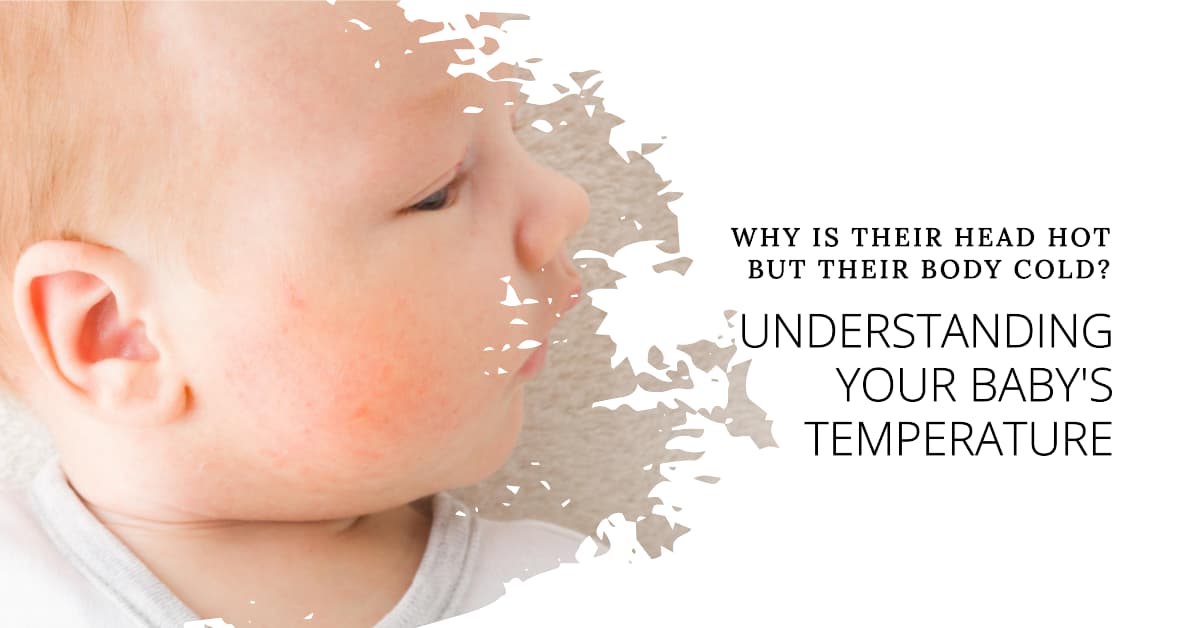Why is My Baby’S Head Hot But Body Cold? When a baby’s head is hot, but its body is cold, it could be a sign of an underlying health condition. It may indicate that the baby has an infection or fever and needs to see a doctor for further evaluation. A common cause of this symptom is infant sepsis when bacteria enter the bloodstream and cause infection throughout the body.
Other possible causes include dehydration, low blood sugar levels, or overdressing in warm weather. In addition to having their head feel hot while the rest of their body is cold, other symptoms may include vomiting, lethargy, rapid breathing or heartbeat, and decreased urination. If you notice your baby exhibiting these signs along with having a hot head but cold body temperature, then contact your paediatrician immediately for medical advice and treatment options.
When a baby’s head is hot, but their body feels cold, it could be an indication of fever. In this case, the head may feel warmer than usual due to elevated temperatures caused by the fever. If you notice that your baby has a hot head and cold body, it is important to take their temperature with a thermometer as soon as possible in order to determine if they have a fever and need medical attention.
Additionally, make sure to keep them hydrated and avoid overdressing them or bundling them up too heavily since this can affect their internal body temperature.
My Baby’s Head is Hot, But their Hands And Feet are Cold
It is normal for a baby’s head to feel warm because babies tend to lose heat through their heads. If your baby’s head feels hot, but the hands and feet are cold, this could be an indication of dehydration or circulation issues. It is important to monitor your baby closely and contact a doctor if there are any further concerns.
Is It Normal for Baby’S Head to Be Hot?
It is not uncommon for parents to feel concerned if their baby’s head feels warm. Many times, a baby’s head can become hot due to the environment or physical activity. It is important for parents to understand that this does not necessarily mean something is wrong with their baby, and most of the time it is normal.
However, if the temperature of your baby’s forehead seems consistently high or there are other symptoms such as fever, fatigue, vomiting or diarrhea, you should seek medical attention immediately. Furthermore, ensure your baby stays cool by using light clothing in the right size and avoiding blankets when possible during the summer. Finally, keep your child hydrated so they don’t overheat – offer plenty of fluids throughout the day!
What Should I Do If My Baby’S Head is Hot?
If you’ve noticed that your baby’s head is hotter than usual, it is important to take action immediately. First, ensure the temperature of their environment isn’t too hot and they have access to fresh air. If the room temperature seems okay, then check for any signs of illness, such as a fever or dizziness.
In this case, call your doctor right away for advice on what to do next. If there are no other symptoms, try cooling them down by removing extra layers of clothing or using a cool damp cloth on their forehead or neck. You can also give them some fluids like water or diluted electrolyte solution if they’re old enough.
It’s best not to use alcohol swabs as these may be too harsh for their delicate skin. Finally, make sure that you check in with your baby regularly and observe how they are responding – if the situation doesn’t improve within an hour then contact a medical professional immediately for more help and advice on how to keep your little one safe and comfortable.
Why My Baby’S Head is Hot But Hands And Feet are Cold?
As a parent, it can be concerning when your baby’s head feels hotter than the rest of their body. Even more so if their hands and feet are cold. Many parents worry that something is wrong with their newborn and seek help from a pediatrician to find out why this is happening.
Head temperature can vary from the rest of the body due to differences in circulation, metabolic rate and even environmental factors such as room temperature or humidity levels. Furthermore, babies have less efficient thermoregulation processes than adults which means they are more likely to experience fluctuations in body temperature over time. To ensure your baby’s health, it is important to keep track of changes in temperature throughout the day and take note if there any other symptoms like chills or fever which could indicate an underlying medical condition requiring treatment.
If you are ever concerned about your child’s health contact your doctor right away for advice on how best to proceed with further investigation into what may be causing the change in temperatures across different parts of your baby’s body.
What is a High Temperature on a Baby’S Head?
A high temperature on a baby’s head is a cause for concern, especially if other signs of illness accompany it. A fever in infants and young children can be dangerous because their immune systems are not as developed as in adults. The normal body temperature range for an infant or child up to three months old is 97.5 to 99 degrees Fahrenheit (36.3 to 37.2 degrees Celsius).
The average normal body temperature ranges from 98-100 F (36-37 C) for babies over three months old. If your baby’s forehead feels hot when you touch it but his rectal temperature reads below 100 F, then he may have excess warmth due to environmental factors such as overdressing or being in a warm room; however, if his forehead feels very hot and his rectal temperature reads above 100 F then this could indicate that the baby has a fever and should see a doctor right away.
Conclusion
In conclusion, paying attention to your baby’s body temperature and being aware of any changes is important. If you notice anything out of the ordinary, such as your baby having a hot head but cold body, it’s best to see a doctor right away. It could easily be something minor that can quickly be addressed.
However, if left unattended the situation may worsen and potentially cause harm to your little one.




